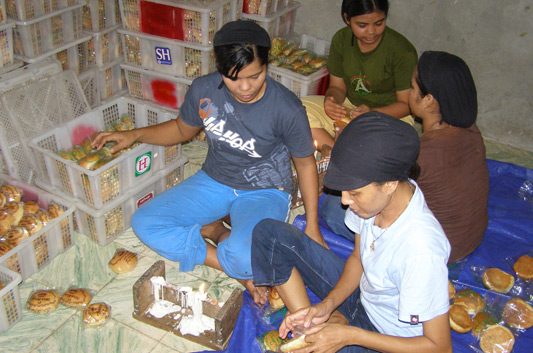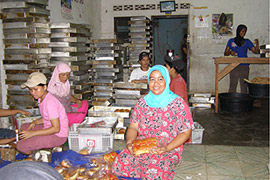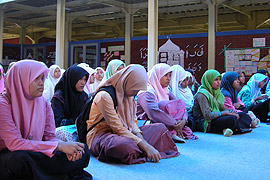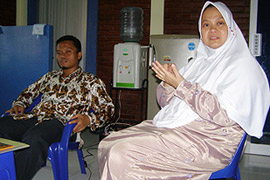Tsunami ‘blessing in disguise’
A baker and a social worker tell of how the 2004 tsunami changed their lives.

Two stories of how the 2004 Indian ocean tsunami changed the lives of a survivor in the Indonesian province of Aceh and a social worker from Jakarta.
|
A baker’s inspiration
Nelly, or Ibu Nelly as she is known in her village, survived the deadly tsunami with her husband and two children.
Like thousands of other tsunami survivors, Nelly lost her relatives and everything else after giant waves flattened Aceh’s coastal communities, and in some parts, slammed into towns 10km from the shore.
“I had a small bakery with six workers in 2001 but lost it all in the tsunami,” she says, stacking flavoured buns into big white plastic crates for transportation.
In the months after the disaster, Nelly and her husband, Ismail, were each earning $3.50 a day to clean up affected areas under a cash-for-work programme run by Mercy Corps, a US-based aid agency.
But Nelly, 33, was keen to start baking again and sought financial assistance from Mercy Corps, which offered to guarantee her bank loan as part of its recovery plan for tsunami victims.
A year later she re-started her bread business in her village of Nusa just outside of the provincial capital Banda Aceh.
“We only had an oven and a mixer,” she says. “And we managed to raise some capital by selling off whatever rice we had stocked up.”
Today, the couple run the fairly successful Nusa Indah Bakery out of an old, cramped house in the village.
About 100 metres away a new and bigger building is under construction.
“We’ll be moving to a cleaner place once our new place is finished later this year because I realise that hygiene and food safety is extremely important in this business,” she says.
Last year they won Rp45m ($4,800) for running the best micro-business in the country, beating more than 5,600 entries in an annual competition held by a big Indonesian firm.
Nusa Indah Bakery now employs about 30 workers and bakes up to 15,000 rolls of buns a day for distribution to major towns across the province.
“When the tsunami hit us, I felt like it was the end of the world,” she says, recalling the morning of December 26.
“I’ll never forget that day … I almost lost the will to live.”
What saved Nelly was the shared burden of loss she experienced with thousands of other tsunami survivors, many suffering a much worse fate than her.
“The disaster has somehow been a blessing in disguise,” she says. “That’s how I’d like to think of it now.”
Boarding school for tsunami orphans
As soon as Draga Rangkuti saw the first news footage of the devastation in Aceh, she knew she had to go and help in some way.
“My heart immediately went out to the children,” she says. “They had lost their families and had nothing and no one left.”
Draga, 46, is co-founder of the Jakarta-based Fajar Hidayah Foundation, a boarding school attended by children from upper middle-class families.
“After learning of the situation in Aceh, I knew that providing psychological counselling alone would not be enough for the children,” she says.
“So I began toying with the idea of opening a boarding school for tsunami orphans.”
Draga and her husband immediately flew to Aceh to help in the massive recovery efforts.
“We wanted to help the children deal with the trauma of losing their families before they can move on with their lives,” she says.
“And we wanted to break the poverty cycle so that these children could help rebuild Aceh.”
The first batch of 300 orphans lived in small rented building in Pagar Air, a remote farming village near Banda Aceh.
Late last year, the Fajar Hidayah integrated boarding school moved to a new $6m complex that can house up to 1,200 children, not far from the old premises.
Mirdas, Draga’s husband, says there were about 40,000 tsunami orphans in Aceh.
“We’ve already received a request to place another 2,000 in our school,” he says.
The couple plans to include child victims from Aceh’s separatist conflict in the future.
Neighbouring Singapore has contributed in a big way to the school project, providing 70 per cent of the funding for the new complex that is being completed in stages.
“If not for the commitment of the government and people of Singapore, Fajar Hidayah would not have a bigger building and better facilities here in Aceh,” says Draga.
Recently, her team was approached by the Aceh government to help train teachers across the province.
Aceh lost about 2,500 teachers in the tsunami.
“The Aceh government wants us to prepare a training syllabus for teachers in the whole province,” Draga says. “We are still discussing the details of the proposal.”
She says the syllabus will be prepared by a Singapore-based early childhood educational organisation.
Puspa Sivan, director of Parent Teacher Child Learning School, says Draga’s grit and determination to help Aceh’s orphans was necessary in a situation where people were suspicious of “outsiders”.
“The people have been through a lot … first the conflict then the tsunami,” she says. “It’s not surprising that they are generally distrustful of anyone from outside of Aceh.”
“The children need to heal and move on. At the same time it is very important that they remember their families.” |



